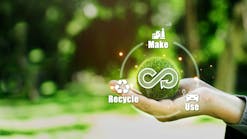By Carlos David Mogollon
August 18, 2008 -- The hot news in the global water scene yesterday was the opening session of World Water Week in Stockholm in which 2008 Stockholm Water Prize laureate John Anthony Allan launched into a tirade against biofuels similar to that of the Singapore International Water Week prize winner in WWi's April/May 2008 issue.
Allan, a professor at King's College London and head of its Water Research Group, noted that the amount of water that goes into production of biofuels takes it well past a net energy loser not to mention its impact on the environment and world food supplies/prices, calling the drive toward increased production "too frightening to even begin to realize," according to an Associated Press report.
The pioneer of the concept of "virtual water," which measures all of the water inputs for a given economic activity, also promoted vegetarianism as meat consumption was bad for the environment as well: "Non-vegetarians consume five cubic meters (176 cubic feet) of water per day; your bath is a tiny puddle compared to that. It is the water for food that is the big problem... Be rational and eat less meat."
His presentation was titled: "Virtual or Embedded Water: Moving the Minds of Consumers"
Another recent report by Allan -- "Three Weddings and Avoiding Two Funerals," London School of Economics, June 2008 -- goes further to explain the relationship between "Water & Energy."
The Stockholm International Water Institute, which hosts the annual event, is posting a daily newsletter at the World Water Week website. Among some of the highlights in Monday's e-newsletter were:
• Calling Corruption Out -- In the seminar "The Global Corruption Report 2008: A Call for Action," panelists described how corruption in water hits the poorest hardest and prevents progress towards Millennium Development Goals. They also suggested "forcing water utilities to publish financial accounts" and spread information on "money and resources stolen through corrupt practices" as effective ways to reduce them.
• Peaceful Waters -- Two seminars, "Conflicts over Water and Water to Solve Conflicts" and "Water Supply and Sanitation: After Disaster and Conflict Situations in Fragile States," discussed how water can instead serve as a tool for conflict management, focusing on "how water can contribute to peace in derailed states such as Haiti, North Korea and Uganda."
• Smart Money -- Discussing "The Impact of WASH Interventions on Children" and UNICEF's upcoming launch of Global Handwashing Day on Oct. 15, better education and promotion of handwashing was called the "biggest bang for the buck" in terms of investing in children's health.
• Thought for Food -- "Water-Related Synergies and Trade-offs - Food and Bioenergy" and "Improve Food Security - Combine Productive Sanitation, Conservation Agriculture and Water Harvesting" discussed a report from the International Water Management Institute and "'eco-sanitation' to create synergies in agricultural production that can enable us to feed more people and improve the sanitation situation."
You can track events in Stockholm all this week via the event's website: www.worldwaterweek.org. WWi
Author's Note: Carlos David Mogollon is managing editor of Water & Wastewater International magazine. To send him a message, click here: [email protected]
###


